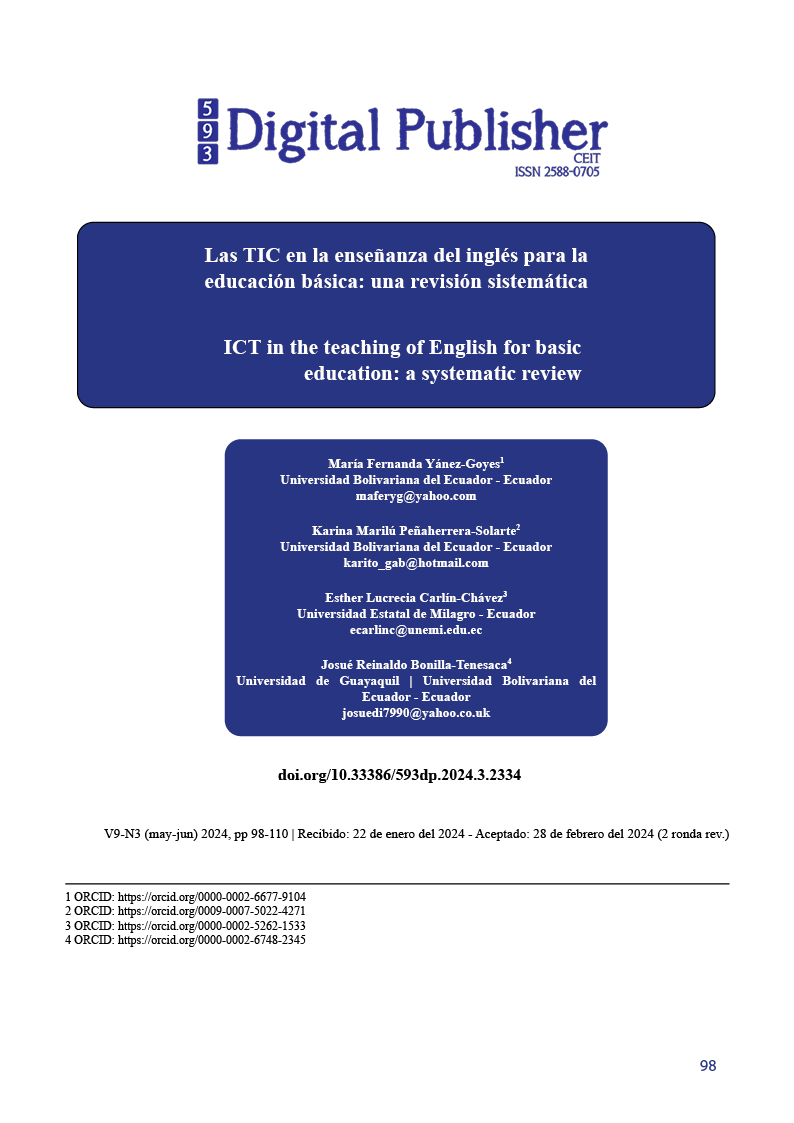Las TIC en la enseñanza del inglés para la educación básica: una revisión sistemática
Contenido principal del artículo
Resumen
En este artículo se ha investigado acerca de la integración de las TIC en la Educación Básica para mejorar la enseñanza del idioma inglés. Esto ha permitido obtener información significativa al relacionar los conocimientos con la realidad, por lo cual se ha considerado importante indagar sobre el uso de las TIC en este proceso. Se ha realizado una revisión documental de carácter cualitativa-descriptiva, no experimental.
Para la búsqueda sistemática se han utilizado diferentes bases de datos como: Scielo, Google Académico, Redalyc, La Referencia, Dialnet y Refseek. Entre los resultados se ha destacado que de un total de 100 artículos y luego de una rigurosa filtración, se obtuvieron 33 artículos válidos para esta investigación, los cuales cumplen con los estándares establecidos en la selección. Los resultados han revelado que las TIC son herramientas efectivas para mejorar el aprendizaje del inglés, ya que proporcionan recursos interactivos y motivadores para los estudiantes. Sin embargo, también se han identificado desafíos en la implementación de las TIC, como la falta de capacitación docente y el acceso limitado a la tecnología en algunas escuelas, por lo que se sugiere que se promueva la capacitación docente y se garantice el acceso a las TIC para aprovechar su potencial en la enseñanza del inglés en la educación básica.
Palabras clave: TIC, enseñanza de idiomas, educación básica, inglés
Descargas
Detalles del artículo

Esta obra está bajo una licencia internacional Creative Commons Atribución-NoComercial-CompartirIgual 4.0.
1. Derechos de autor
Las obras que se publican en 593 Digital Publisher CEIT están sujetas a los siguientes términos:
1.1. 593 Digital Publisher CEIT, conserva los derechos patrimoniales (copyright) de las obras publicadas, favorece y permite la reutilización de las mismas bajo la licencia Licencia Creative Commons 4.0 de Reconocimiento-NoComercial-CompartirIgual 4.0, por lo cual se pueden copiar, usar, difundir, transmitir y exponer públicamente, siempre que:
1.1.a. Se cite la autoría y fuente original de su publicación (revista, editorial, URL).
1.1.b. No se usen para fines comerciales u onerosos.
1.1.c. Se mencione la existencia y especificaciones de esta licencia de uso.
Citas
Aguaded, J. I., Cabero, J., Pérez, M., Pérez, M. A., Monescillo, M., Barroso, J. M., Marchena, J., Del Pozo, F., Morduchowicz, R., Martínez, F., Salinas, J., Cebrian, M., García, P., Reia, V., Trápaga, F., Dorrego, E., Fandos, M., Borrás, I., Iriat, C., & Romero, P. (1995). Educación y medios de comunicación en el contexto iberoamericano. En Universidad de Andalucía (Editor), Encounters Iberoamericanos (Anma/Huelva) (sin detalles de páginas)
Aguirre Idrogo, Y. M., Vargas Navarro, R., Huamán Guzmán, A. M., & Gutiérrez Narrea, G. S. (2021). Uso de las TIC en la comprensión de textos del idioma Inglés en estudiantes de secundaria. Horizontes. Revista de investigación en ciencias de la educación, 5(21), 1419–1429. https://doi.org/10.33996/revistahorizontes.v5i21.285
Alghamdi, A., & Khan, M. S. H. (2021). Role of ICT in teaching English language skills to EFL learners at the primary level: Overview and future directions for research. International Journal of Instructional Technology and Distance Learning, 18(7), 9–23.
Bauman, Z. (2007). Retos de la educación en la modernidad líquida. Revista Andina de Educación, mayo-octubre, 2021, 4(2), 119–120. https://doi.org/10.32719/26312816.2021.4.2.r1
Brand Fonseca, K. A., Barrantes Elizondo, L., Segura Arias, R., & Arguedas Zúñiga, R. (2023). Needs for professional development training in English language education: Case study from the Region Brunca of Costa Rica. Revista Educación. Obtenido de https://doi.org/10.15517/revedu.v47i1.52010
Calderón Rojas, B. M., & Córdova Esparza, D. M. (2020). B-learning en la enseñanza del idioma inglés como segunda lengua: una revisión sistemática de la literatura. Edutec. Revista Electrónica de Tecnología Educativa, (73), 105-121. https://doi.org/10.21556/edutec.2020.73.1745
Cango-Patiño, A. E., & Bravo-Reyes, M. Á. (2020). Teaching English at public educational institutions in Ecuador in the digital age. Polo del Conocimiento, 5(3), 51–68. https://doi.org/10.23857/pc.v5i3.1322
Carranza Alcántar, M. del R., Islas Torres, C., & Maciel Gómez, M. L. (2018). Students' perception about the use of information communication technology (ICT) and learning English. Apertura, 10(2), 50–63. https://doi.org/10.32870/ap.v10n2.1391
Castañeda-Trujillo, J. E., & Jaime Osorio, M. F. (2021). Pedagogical strategies used by English teacher educators to address the challenges imposed by emergency remote teaching due to the COVID-19 pandemic. Ikala, 26(3), 697–713. https://doi.org/10.17533/udea.ikala/v26n3a12
Cohen, S. L., & Calderón Aponte, D. (2021). Powerful pedagogies in times of COVID: Online collaborative work among EFL learners and ESL student teachers. Ikala, 26(3), 731–745. https://doi.org/10.17533/udea.ikala.v26n3a14
Cruz Picón, P. E., & Hernández Correa, L. J. (2021). Bauman, Zygmunt. (2007). Los retos de la educación en la modernidad líquida. Gedisa. Revista Andina de Educación 4 (mayo-octubre, 2021), 4(2), 119–120. https://doi.org/10.32719/26312816.2021.4.2.r1
Cuberos de Quintero, M. A., & Vivas García, M. (2017). The relationship between methodology, management, and educational uses of ICT. Actualidades investigativas en educación, 17(1). https://doi.org/10.15517/aie.v17i1.27198
Dover-Carrillo, Y., Rosales-Acosta, A., & Pérez-Vidaurre, R. (2019). Construction of a methodology for English learning in rural settings: Contribution of apprentices. Electronic Journal Education Care, 23(1), 1–24. https://doi.org/10.15359/ree.23-1.14
Fořtová, N., Sedláčková, J., & Tůma, F. (2021). "'And My Screen Would Not Share':" Preservice Teachers' Perspectives on Using Information Communication Technology in Online Practice and Instruction. Ikala, 26(3), 513–529. https://doi.org/10.17533/udea.ikala/v26n3a03
Galindo, A., & Moreno, L. M. (2019). Spanish-English bilingual education in three public schools in Quindío, Colombia: Case study. Lenguaje, 47(2S), 648–684. https://doi.org/10.25100/lenguaje.v47i3.6906
Gómez Domíнгuez, C. E., Ramírez Romero, J. L., Martínez-González, O., & Chuc Piña, I. (2019). Use of ICT in English instruction in primary public schools. Revista de estudios y experiencias en educación, 18(36), 75–94. https://doi.org/10.21703/rexe.20191836gomez4
González-García, O., Pérez-Paredes, P., & Ruano-Ramírez, Á. (2021). Using mobile devices to teach reading comprehension strategies through collaborative tasks among young children: A systematic literature review. Computers & Education, 163, 104148. https://doi.org/10.1016/j.compedu.2021.104148
Hernández Cruz, J. A., Rojas León, P. del R., & Eslava Gómez, H. O. (2023). Analyses of TIC in teaching-learning process in one ESOL institution. Cinzontle, 15(30), 26–34. https://doi.org/10.19136/cz5085x23
Hernández, D. (2019). Didactic use of Learning Technologies and Knowledge (LTK) by secondary and middle school teachers. Horizontes. Revista de investigación en ciencias de la educación, 2(7), 190–209. https://doi.org/10.33996/revistahorizontes.v2i7.56
Izquierdo, J., de-la-Cruz-Villegas, V., Aquino-Zúñiga, S.-P., Sandoval-Caraveo, M.-C., & García-Martínez, V. (2017). Teachers' use of ICTs in public language education: Evidence from second language secondary-school classrooms. Comunicar, 25(50), 33–41. https://doi.org/10.3916/c50-2017-03
Jaimes, M., & Jaimes, C. (2014). Las tecnologías de la información y la comunicación (TIC) como herramienta de enseñanza del inglés en las instituciones de educación básica primaria de la región dos (2-4). Recuperado de http://www.computadoresparaeducar.gov.co/PaginaWeb/images/biblioteca/InvestigaTIC/Region%202/INvestigacion%203/articulo.pdf (consultado el 4 de diciembre de 2016)
Laura, K., Noa, S., Lujano, Y., Alburque qu eque, M., Medina, G., & Pilicit a, H. (2021). New perspective through English teaching. Invisible learning contributions to foreign language acquisition. Revista Innova Educación, 3(3), 140–148. https://doi.org/10.35622/j.rie.2021.03.009
Lizasoain C., A., Ortiz de Zárate F., A., & Becchi Mansilla, C. (2018). Usage of a technological tool for English teaching in a rural setting. Educação e Pesquisa, 44(0). https://doi.org/10.1590/s1678-4634201844167454
Llamas-Salguero, F., & Macías Gómez, E. (2017). Initial teacher training in elementary education for generating knowledge with information and communications technologies. Revista Complutense de Educación, 29(2), 577–593. https://doi.org/10.5209/rced.53520
Llanos Encalada, M., & Criollo Quimí, L. K. (2022). Use of technological tools in the teaching-learning process of English in the rural area of Ecuadorian countryside. Revista de la Universidad del Zulia, 13(38), 714–733. https://doi.org/10.46925//rdluz.38.39
Mantuano-Cedeño, G. Y., & Rivadeneira-Barreiro, J. C. (2022). Technological tools and their impact on English language teaching and learning in the rural zone of Cantón Jipijapa. Yachasun – Revista científica multidisciplinaria arbitrada, 6(11 Ed. Esp.), 221–243. https://doi.org/10.46296/yc.v6i11edespag.0212
Martínez Molina, O. A. (2018). Use of information and communication technologies in basic education. Scientific Review, 3(10), 154–174. https://doi.org/10.29394/scientific.issn.2542-2987.2018.3.10.8.154-174
Olivares Garita, C., Brenes Sánchez, V., & Valverde Marín, E. (2019). R2D2: An effective model to integrate ICTs into the EFL classroom? Actualidades investigativas en educación, 20(1), 32. https://doi.org/10.15517/aie.v20i1.40098
Ortiz Rodriguez, H. G., & Tejeda Díaz, R. (2023). Use of ICTs for English learning among high school students. Revista Cognosis, 8(EE1), 127–142. https://doi.org/10.33936/cognosis.v8iee1.5301
Pamplón Irigoyen, E. N., Ramírez Romero, J. L., & Universidad de Sonora. (2018). Textbooks for English teaching in Mexican public primary schools and alignment with official approach. Ikala, 23(1), 141–157. https://doi.org/10.17533/udea.ikala.v23n01a10
Pérez Benítez, W. E., & Ricardo Barreto, C. T. (2022). Factors affecting reading comprehension skills of basic education students and its relation to ICTs. Ikala, 27(2), 332–354. https://doi.org/10.17533/udea.ikala.v27n2a03
Pérez-Benítez, W. E., & Ricardo Barreto, C. T. (2021). Characteristics of enhanced learning environments using ICTs for reading comprehension within Basic Education cycle. Saber Ciencia y Libertad, 16(1). https://doi.org/10.18041/2382-3240/saber.2021v16n1.7533
Quiñonez Pech, S. H. (2020). Digital competence of English teachers in primary education in southeastern Mexico. RIDE Revista iberoamericana para la investigación y el desarrollo educativo, 11(21). https://doi.org/10.23913/ride.v11i21.752
Roldán, Á. M., Amigó, F. Ú. L., Peláez Henao, O. A., & Amigó, F. Ú. L. (2017). Relevance of policies for English teaching in a Colombian rural area: A case study in Antioquia. Ikala, 22(2), 121–139. https://doi.org/10.17533/udea.ikala.v22n01a08
Roys Romero, N. R. (2019). Integration of ICTs to improve linguistic abilities of vulnerable communities' EFL students. Sophia, 15(2), 4–17. https://doi.org/10.18634/sophiaj.15v.2i.770
Saborío-Taylor, S. (2019). Curriculum proposal based on a bi-modal approach and interactive infographic medium for "Didactic Resources Course for English Language Teaching". Revista Electrónica Educare, 23(3), 1–19. https://doi.org/10.15359/ree.23-3.11
Swapna, K., & Tammelin, N. (2008). Integrating ICTs for second languages teaching/learning: A guide for European secondary, university, and adult education institutions. Austria: Johannes Kepler University Linz. Recuperado de https://ensinodelinguascomtic.files.wordpress.com/2010/03/livro_integrar_las_tic_en_ensenanza-aprendizaje_de_lenguas_2008.pdf
Tapia, C. (2020). Typologies of educational uses of Information and Communication Technologies: A systematic literature review. Edutec. Revista Electrónica de Tecnología Educativa, (71), 16–34. https://doi.org/10.21556/edutec.2020.71.1489
Tutillo-Piña, J. M., García-Herrera, D. G., Castro-Salazar, A. Z., & Erazo-Álvarez, J. C. (2020). Genially as an interactive tool for verbs learning in English. Interdisciplinary Peer-Reviewed Journal Koinonía, 5(5), 250. https://doi.org/10.35381/r.k.v5i5.1042
Zainal, A. Z., & Zainuddin, S. Z. (2021). Malaysian English language teachers' agency in utilizing digital technologies during the pandemic: A narrative inquiry. Ikala, 26(3), 587–602. https://doi.org/10.17533/udea.ikala.v26n3a07
Zambrano Mero, J. A., Lemoine Quintero, F. Á., Carvajal Zambrano, G. V., & Williams Zambrano, M. S. (2017). Application of information and communication technologies in the English language teaching-learning process. Revista Cognosis (ISSN 2588-0578), 2(4), 57. https://doi.org/10.33936/cognosis.v2i4.940





